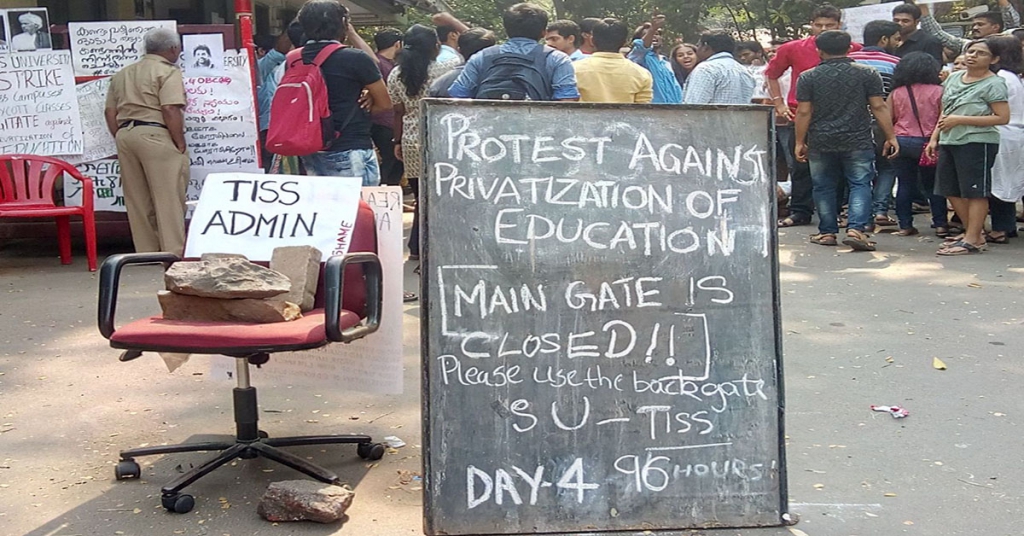
Is TISS Pushing SC-ST-OBC students away from academia? Cutback of scholarship funds impacts their presence in higher education
08, Mar 2018 | Prof Madhu Prasad
The All-India Forum for Right to Education (AIFRTE) extends its full support and solidarity to the legitimate struggle of the students of all four campuses (Mumbai, Gawahati, Tuljapur and Hyderabad) of the Tata Institute of Social Sciences (TISS). Starting their struggle from 21st February 2018, students have boycotted all classes, field work and submissions at all campuses after months of dialogue and negotiations between the students union and the administration failed to make the authorities revoke their decision to withdraw financial aid to SC/ST students from this academic year.
SC/ST and OBC students receive aid under the Government of India’s Post-Matric Scholarship Scheme. Without the aid from the institution they would be required to pay in full the fees and mess charges, both of which have also been steeply increased recently. Reimbursement would be made only if and when the central government releases funds to the institution.
Financial aid has been stopped for OBC students since 2015, leading to an approximately 9% drop in admissions from this category.
The behavior of the authorities is completely arbitrary and untenable. The 2016-18 class found aid abruptly withdrawn in 2017. The 2017-19 class found aid withdrawn at the time of admissions. The students union demanded that the illegal decision be immediately revoked. Further they demanded that TISS continue to make timely provision for aid as otherwise SC/ST and OBC students would be unable to bear the financial burden of paying full fees.
TISS authorities initially ignored the demand but four days into the boycott action students were even denied the breakfast which had been prepared for them.

The vindictive reaction of the authorities, to protests against the decision to deny financial aid to students who have a constitutional right towards affirmative action, is an alarming indication of the speed with which the current central and state governments are privatizing higher education. It is most unfortunate that authorities and administrators at educational institutions are not resisting such actions, but falling in line with them at the expense of corrective measures to promote social justice.
Higher education has been chronically starved of funds and pushed towards marketization over the past 25 years under pressure from the World Bank and then by the central government’s refusal to pull-out of the ill-conceived commitment made in 2005 to offer Higher Education as a ‘tradeable service’ for regulation by the World Trade Organization- General Agreement on Trade in Services (WTO-GATS). However, since 2014 decisions taken by the central and state governments are,
- Slashing educational budgets, introducing a 30%-70% division of market contribution and government grants for higher education, and aggressively forcing institutions of higher education to resort to fee hikes, to replace scholarships/ grants with loans, and resort to privatization, commercialization and marketization of the entire higher education sector;
- Denying the majority of young people in the relevant age group (i.e. 18 – 24 years) from gaining access to higher education. The report of the National Sample Survey (NSS) 2014, shows as many as 44.81 million Indian students are too poor to pursue higher education. The private expenditure per student on education for general courses has increased by 175.8%, and that for technical/professional and vocational courses has almost doubled from the 2007-08 NSS report to the 2014 NSS report;
- Targeting, with clear Manuvadi intention, SC/ST and OBC students whose access to higher education is already less than 10% as more than 90% cannot complete Class XII due to privatization policies that have led to dismantling of the state-funded school system.
The special rapporteur of the United Nation’s Human Rights Council on the right to education had clearly stated in a June 2015 report that “privatization negatively affects the right to education both as an entitlement and as empowerment” and “breeds exclusion and marginalization, with crippling effects on the fundamental principle of equality of opportunity in education.”
The latest decision of the central government accepting the UGC’s new formula for implementing SC/ST and OBC reservations in teaching posts, by calculating on a department-wise basis instead of on total posts in the university/ college, makes it clear that the TISS withholding of scholarship funds for SC/ST and OBC students is part of a strategy to significantly reduce the presence of these sections in higher education.
With SC faculty at a mere 7.22% and ST at only 2.2% of total faculty in India’s 716 universities and 38,056 colleges, it was expected that appointments to the currently 35% vacant faculty positions would play a major role in correcting this negative trend.
However, the new formula will significantly reduce representation of SC/ST and OBC faculty in all future recruitment drives. (Indian Express, 2 March 2018) AIFRTE strongly condemns these negative policy decisions which deny the SC/ST and OBC citizens their right to equality and social justice.
The government’s present strategy violates the Constitutional commitment to affirmative action and social justice. AIFRTE is forced to reach the unavoidable conclusion that this is calculated policy and is aimed at undoing even the limited attempts made earlier to prevent higher educational institutions from shutting their doors to those discriminated against on the basis of caste, creed, gender, tribal, and disability conditions.
AIFRTE therefore demands,
- That financial aid be immediately secured and provided to all SC/ST and OBC students at TISS;
- That scholarships be provided (without introducing discriminatory eligibility conditions such as NET) and enhanced for all students who are unable to afford the fees;
- That fees be strictly regulated in all higher educational institutions by including students union and faculty association representatives in all appropriate bodies so that no arbitrary decisions are implemented;
- That the Central Government immediately rejects the UGC’s `new’ formula. SC/ST and OBC reservation in faculty should continue to be calculated on the basis of the university/college taken as a whole.
—
*The author is the spokesperson for AIFRTE









